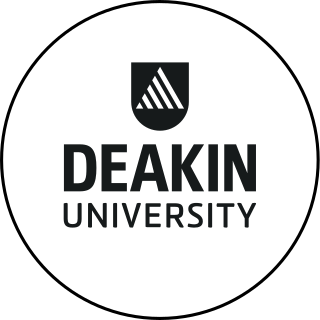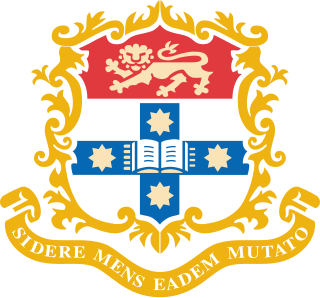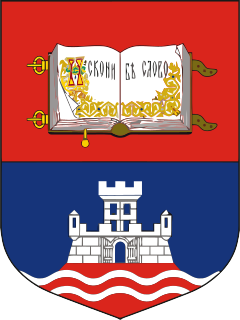
The Australian National University (ANU) is a national research university located in Canberra, the capital of Australia. Its main campus in Acton encompasses seven teaching and research colleges, in addition to several national academies and institutes.

Western Sydney University, formerly the University of Western Sydney, is an Australian multi-campus university in the Greater Western region of Sydney. It is a provider of undergraduate, postgraduate and higher research degrees with campuses in Bankstown, Blacktown, Campbelltown, Hawkesbury, Parramatta, and Penrith. It is currently ranked in the top 400 in the world in the 2019 THE World University Rankings and 19th in Australia in 2019.

The University of South Australia (UniSA) is a public research university in the Australian state of South Australia. It is a founding member of the Australian Technology Network of universities, and is the largest university in South Australia with approximately 32,000 students.

The University of Wollongong is an Australian public research university located in the coastal city of Wollongong, New South Wales, approximately 80 kilometres south of Sydney. As of 2017 the university has an enrolment of more than 32,000 students, an alumni base of more than 131,859 and over 2,000 staff members.
Robert J. Sternberg is an American psychologist and psychometrician. He is Professor of Human Development at Cornell University. Prior to joining Cornell, Sternberg was president of the University of Wyoming. He has been Provost and Professor at Oklahoma State University, Dean of Arts and Sciences at Tufts University, IBM Professor of Psychology and Education at Yale University. He is a member of the editorial boards of numerous journals, including American Psychologist. He was the past President for the American Psychological Association.

Deakin University is a public university in Victoria, Australia. Established in 1974 with the passage of the Deakin University Act 1974, the university was named after the second Prime Minister of Australia, Alfred Deakin.
Russell Brunell Trood was a Liberal Party Senator for the state of Queensland, Australia. His surprise election as the third Liberal from Queensland in the 2004 Federal Election, along with 38 other Coalition Senators gave the federal government of John Howard a majority in the Senate and thus control of both houses of Parliament. He did not retain his seat in the Australian federal election, 2010. His term in the senate ended on 30 June 2011.
Rohan Gunaratna is a Singaporean analyst on security affairs. He is a Professor of Security Studies at the S. Rajaratnam School of International Studies in Nanyang Technological University, Singapore. Currently, he is a professor of Security studies at the ICPVTR in S. Rajaratnam School of International Studies.
Paul Wilkinson CBE was a terrorism expert and an Emeritus Professor of International Relations and Director of the University of St Andrews Centre for the Study of Terrorism and Political Violence (CSTPV). Dubbed "Britain's leading academic specialist in the study of terrorism", he was a frequent commentator in mainstream British media and an advisor to the UK government.

Carol S. Dweck is the Lewis and Virginia Eaton Professor of Psychology at Stanford University. Dweck is known for her work on the mindset psychological trait. She taught at Columbia University, Harvard University, and the University of Illinois before joining the Stanford University faculty in 2004.
Tony Vinson was an Australian academic, regarded as "one of Australia's leading social scientists and outspoken public intellectuals". His career spanned the disciplines of social work, social policy, psychology, education, public administration and social research.
The Faculty of Science is a constituent body of the University of Sydney, Australia. It was established in 1882.
Ashley William Goldsworthy is an Australian computer scientist and business executive. He was federal president of the Liberal Party of Australia from 1990 to 1993. He currently holds the title of deputy chair title on the Brisbane Catholic Education Council. He is a director of the anti-same-sex marriage lobby group Marriage Alliance.

Christopher F. Chabris is an American research psychologist, currently Senior Investigator (Professor) at Geisinger Health System, Visiting Fellow at the Institute for Advanced Study in Toulouse, France, and Associate Professor of Psychology and co-director of the Neuroscience Program at Union College in Schenectady, New York. He is best known as the co-author of the popular science book The Invisible Gorilla, which presents the results of research into attention and other cognitive illusions.

Clive Williams is a British-born former Australian Army Military Intelligence officer, and academic with research interests in terrorism and counterterrorism, politically motivated violence, insurgency and counterinsurgency.

Anne Azza Aly is an Australian politician who has been a Labor member of the House of Representatives since the 2016 election, representing the electorate of Cowan in Western Australia. She was previously an academic specialising in counter-terrorism.
Elizabeth Ann Wilson is an Australian author, professor, and Samuel Candler Dobbs Professor at Emory University.

Christian Guttmann is a German-Australian scientist and entrepreneur in Artificial Intelligence, Machine Learning and Data Science. He is currently the vice president, global head of Artificial Intelligence and Chief Artificial Intelligence and Data Scientist at Tieto. At Tieto, he is responsible for strategy and execution of Artificial Intelligence and Innovation. He is an adjunct associate professor at the University of New South Wales, Australia and Adjunct researcher at the Karolinska Institute, Sweden. Guttmann is an entrepreneur, and co-founded startups where he led the business and product development using Artificial Intelligence technology. He has edited and written 7 books, over 50 publications and 4 patents in the field of Artificial Intelligence. He is a keynote speaker at international events, including the International Council for Information Technology (ICA) in Government Administration and CeBIT and is frequently cited by Nordic and international media, such as the MIT Sloan Management review and Bloomberg.












